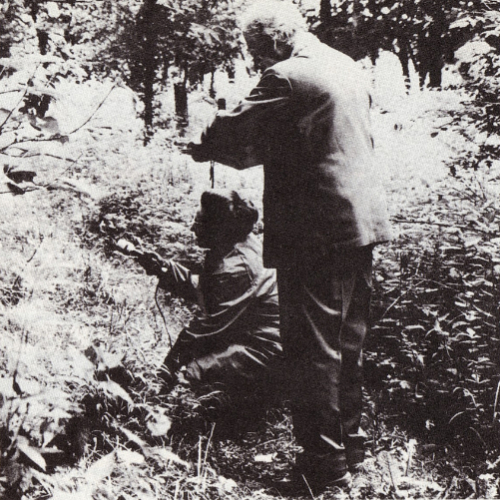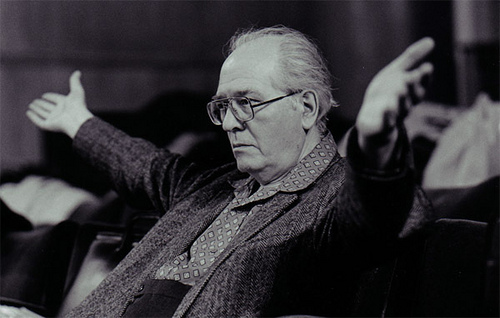"Comme un oiseau."
—Olivier Messiaen
notes for the violin & clarinet
Quatuor pour la fin du temps: Liturgie de cristal, I.
This week, Gwen moderated a discussion with a quartet of musicians who are performing Messiaen's Quartet for the End of Time, a work based on the Revelation of Saint John and influenced by birdsong. Here are some of her notes:
OLIVIER MESSIAEN: b. 10 Dec 1908 d. 27 Apr 1992
Composer, organist, teacher, ornithologist. Student of Paul Dukas, Maurice Emmanuel, Charles-Marie Widor, and Marcel Dupré. Taught Pierre Boulez, Karlheinz Stockhausen, and Tyonne Loriod. Appointed organist at the Église de la Sainte-Trinité in Paris, 1931, a post he held until his death.
At the beginning of the conversation, I played two pieces of tape:
Then I asked the musicians to try to replicate those sounds. That put everyone in the mindset of Messiaen, who wrote this composition while in a prisoner of war camp in Germany during WWII. He wrote for those specific instrumental parts because those were the musicians he knew in the camp.
Messiaen called birds "PERFECT MUSICIANS."
He and his second wife, pianist Yvonne Loriod, were ornithologists. They're seen in the photo by R. Fassey recording birdsong.

The clarinetist Tuesday was a man called Alexander Fiterstein who was born in Belarus and raised in Upper Jerusalem, Israel. He said the original clarinetest who helped debut the work at the camp was also Jewish and afraid that one day he would be discovered as a Jew and sent to a concentration camp. My understanding is that he was not.
But the original performance of the quartet was remarkable because the concert took place before fellow prisoners and guards at the camp. The guards had given Messiaen permission, time and tools to compose.
What also makes the piece interesting is that it defies time. [Indeed, one reading of the French title could be "Quartet for the End of (Musical) Meter."] It's unusually long for a chamber piece (50 minutes). It has eight movements. The rhythms are often odd and assymetrical. Then there's an unusually long clarinet solo.
We've put together a playlist for you. The first 8 cuts are a recording of the Quartet performed by four other musicians. Then cuts 9-11 are a Saint-Saëns piano concerto featuring pianist Danny Driver, who is playing the Messiaen here in New Orleans. Cuts 12-15 are a piece that features the clarinetist Alexander Fiterstein.
Here's the lineup of the quartet at the Birdfoot Festival:
Danny Driver, piano
Lisa Romain, violin
JoAnn Whang, cello
Alexander Fiterstein, clarinet
They do not normally play together but are doing so for the festival.
The titles of the movements tell you something about the soul of the composer. The following are his words from "Appendix A, Composer's Preface," translated from the French by Rebecca Rischin.
1. "Crystal Liturgy." Between 3 and 4 o'clock in the morning, the birds awaken: a solo blackbird or nightingale improvises, surrounded by dustwhirls of sound, by a halo of harmonics lost high up in the trees. Transpose this on a religious plane: you have the harmonious silence of heaven.
2. "Vocalize, for the Angel Who Announces the End of Time."
3. "Abyss of the Birds." Unaccompanied clarinet. The abyss is Time, with its weariness and gloom. The birds are the opposite of Time; they represent our longing for light, for stars, for rainbows and for jubilant song!
4. "Interlude."
5. "Praise for the Eternity of Jesus."
6. "Dance of Fury, for the Seven Trumpets."
7. "Tangle of Rainbows, for the Angel Who Announces the End of Time."
8. "Praise to the Immortality of Jesus."
— "And I repeat again what I said earlier: "Given the awesomeness of the subject, all of the above serves merely as inarticulate and tentative explanation."
You have got to watch this clip of Olivier Messiaen and Yvonne Loriod.
 Composer, organist, & ornithologist Olivier Messiaen
Composer, organist, & ornithologist Olivier MessiaenThursday, May 23, 2013 at 8 p.m & 10 p.m
Night Train at Snug Harbor
Friday, May 24, 2013 at 8 p.m
Salon at the Little Gem
Saturday May 25, 2013 at 8 p.m
Final Gala Concert